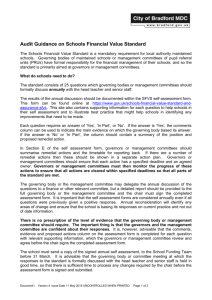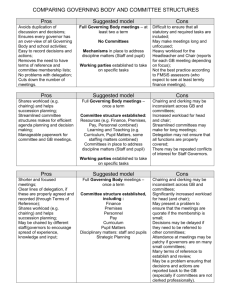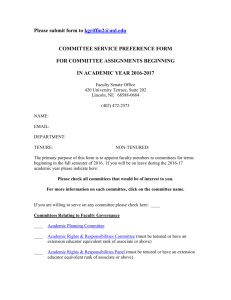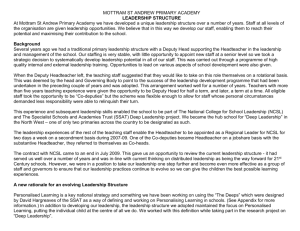Introduction - Governors Wales
advertisement
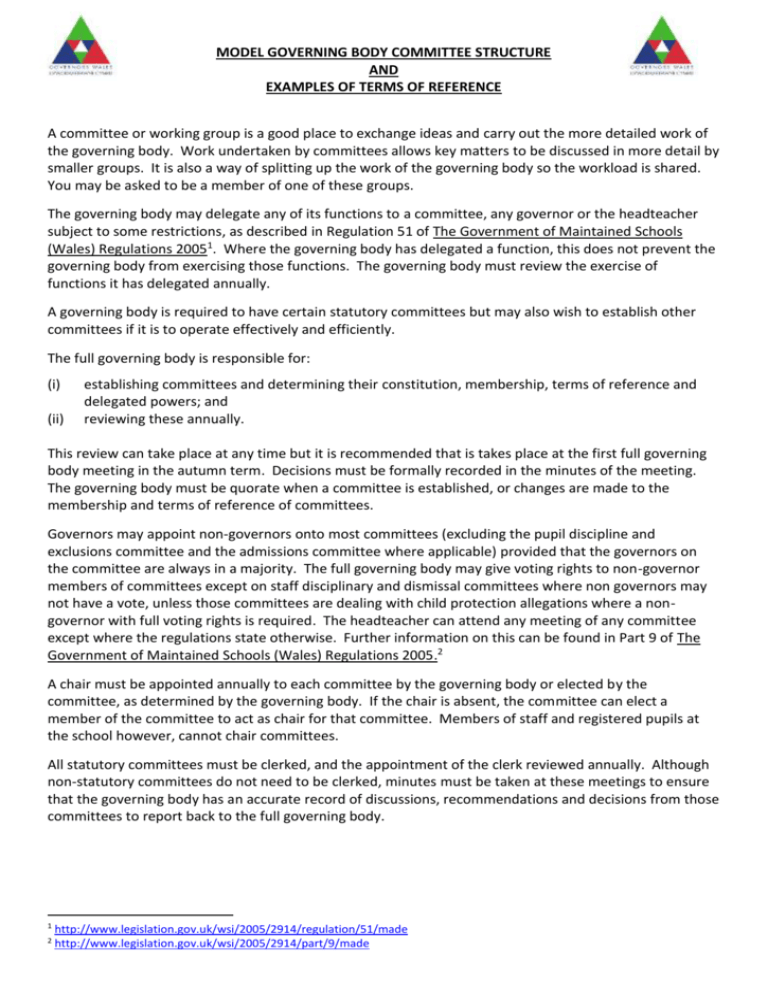
MODEL GOVERNING BODY COMMITTEE STRUCTURE AND EXAMPLES OF TERMS OF REFERENCE A committee or working group is a good place to exchange ideas and carry out the more detailed work of the governing body. Work undertaken by committees allows key matters to be discussed in more detail by smaller groups. It is also a way of splitting up the work of the governing body so the workload is shared. You may be asked to be a member of one of these groups. The governing body may delegate any of its functions to a committee, any governor or the headteacher subject to some restrictions, as described in Regulation 51 of The Government of Maintained Schools (Wales) Regulations 20051. Where the governing body has delegated a function, this does not prevent the governing body from exercising those functions. The governing body must review the exercise of functions it has delegated annually. A governing body is required to have certain statutory committees but may also wish to establish other committees if it is to operate effectively and efficiently. The full governing body is responsible for: (i) (ii) establishing committees and determining their constitution, membership, terms of reference and delegated powers; and reviewing these annually. This review can take place at any time but it is recommended that is takes place at the first full governing body meeting in the autumn term. Decisions must be formally recorded in the minutes of the meeting. The governing body must be quorate when a committee is established, or changes are made to the membership and terms of reference of committees. Governors may appoint non-governors onto most committees (excluding the pupil discipline and exclusions committee and the admissions committee where applicable) provided that the governors on the committee are always in a majority. The full governing body may give voting rights to non-governor members of committees except on staff disciplinary and dismissal committees where non governors may not have a vote, unless those committees are dealing with child protection allegations where a nongovernor with full voting rights is required. The headteacher can attend any meeting of any committee except where the regulations state otherwise. Further information on this can be found in Part 9 of The Government of Maintained Schools (Wales) Regulations 2005.2 A chair must be appointed annually to each committee by the governing body or elected by the committee, as determined by the governing body. If the chair is absent, the committee can elect a member of the committee to act as chair for that committee. Members of staff and registered pupils at the school however, cannot chair committees. All statutory committees must be clerked, and the appointment of the clerk reviewed annually. Although non-statutory committees do not need to be clerked, minutes must be taken at these meetings to ensure that the governing body has an accurate record of discussions, recommendations and decisions from those committees to report back to the full governing body. 1 2 http://www.legislation.gov.uk/wsi/2005/2914/regulation/51/made http://www.legislation.gov.uk/wsi/2005/2914/part/9/made Things to consider when reviewing the committee structure: Does the structure allow us to carry out our tasks effectively? Do the terms of reference and remits properly describe what each committee does? Are there new tasks which need to be added? How the committees report back to the full governing body? Is this working effectively? Is the workload fairly distributed? Do all governors have the chance to be involved? Is attendance at committee meetings quorate? Is the membership up to date? In addition to the above, the governing body may wish to consider determining the purpose of each of its committees, e.g. the purpose of the Premises, Health & Safety Committee is to ensure the provision of a 21st Century Learning Environment. Defining the ‘purpose’ provides a focus for the committee. The statutory committees and panels of the governing body are: Staff disciplinary and dismissal committee; Staff disciplinary and dismissal appeals committee; Pupil discipline and exclusions committee; Admissions committee (Voluntary Aided and Foundation schools only); and Headteacher and deputy head selection panel. The governing body must also have procedures and members in place for the following: Headteacher performance management appraisers and appeals appraiser(s); Teacher performance management appeals; Pay review and pay review appeals; Complaints; Headteacher capability and headteacher capability appeals; Staff grievance and staff grievance appeals; and Headteacher capability panel and headteacher capability appeals panel. Other committees can be established to discuss the detail of other matters such as: Finance; Curriculum; Premises, health and safety; and Staffing. Please note that some governing bodies may combine some of the committees, e.g. finance with premises. Others may have a single committee covering finance, premises and personnel called Resources. Working groups may also be set up to look at areas, such as: Marketing; Links with the community; Quality Mark; and Estyn Inspection etc. This document provides example terms of reference for committees and an example model committee structure (at Appendix 1). It is for each governing body to decide on its own committee structure and terms of reference which is appropriate to its needs. A good structure will help to monitor, evaluate and deliver the strategic aims and objectives outlined in the School Development (Improvement) Plan. It is essential that terms of reference for each committee, be it statutory or otherwise, are drawn up. What should be included the terms of reference for committees? The name of the committee Rules for membership: o Is the headteacher a member? o Is the chair of governors a member? o Will non-governor members be invited onto the committee and if so, will they have voting rights? o Named reserve members (in priority order). Quorum for meetings: o Statutory committees Information can be found in Regulations 55-57 of The Government of Maintained Schools (Wales) Regulations 20053 o Headteacher and deputy headteacher appointment panels Information can be found in regulations 10 and 24 of the Staffing of Maintained Schools (Wales) Regulations 20064 o Non-statutory committees and panels 50% rounded up to the nearest whole number, excluding vacancies and governors on suspension The expectations of the committee: o the overall purpose; o the areas for which it is responsible; and o the tasks it will undertake. The powers of the committee: o does it have full delegated powers to make decisions, or o no powers? Some functions cannot be delegated to a committee, e.g. acceptance of the school budget as described in Regulation 51 of The Government of Maintained Schools (Wales) Regulations 2005.5 How the chair is elected – by the committee or the whole governing body? Frequency of meetings How meetings will be called, recorded and reported: o Who is the clerk? o How will the minutes be circulated to the rest of the governing body? Arrangements for the review of the terms of reference (it is a statutory requirement that these are reviewed annually by the whole governing body) How and when do the committees report back to the governing body? RESOURCE MATERIAL 3 http://www.legislation.gov.uk/wsi/2005/2914/part/9/made http://www.legislation.gov.uk/wsi/2006/873/part/2/made 5 http://www.legislation.gov.uk/wsi/2005/2914/regulation/51/made 4 The Government of Maintained Schools (Wales) Regulations 2005 (SI 2005/2914)6 The Staffing of Maintained Schools (Wales) Regulations 2006 (SI 2006/873)7 The Handbook for School Governors in Wales8 Chapter 4 - A School Governors Guide to the Law9 Information provided by Local Authorities / Diocesan Authorities Please note that this guide offers a summary for committees with examples of terms of reference for governing bodies to adapt to the needs of their school. It should be used in conjunction with detailed advice and support produced by your LA and diocesan authority where appropriate. 6 http://www.legislation.gov.uk/wsi/2005/2914/contents/made http://www.legislation.gov.uk/wsi/2006/873/contents/made 8 http://www.governorswales.org.uk/handbook/ 9 http://www.governorswales.org.uk/law/ 7


